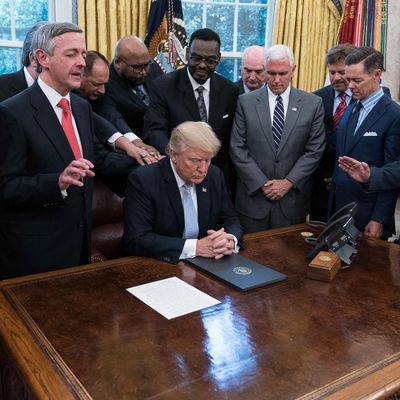
Perhaps no phenomenon of contemporary politics is more baffling to the mainstream media — or so disturbing to those of us who are religious believers — as the affection white conservative Evangelicals have for Donald J. Trump. Lord knows I’ve tried to examine it from every available angle, and like most observers who don’t flee screaming at the sound of a supernatural claim, have dwelled on the elaborate set of rationalizations Christian right leaders have offered for enlisting in this decidedly unholy man’s political army.
Some claim against all evidence that Trump is himself a man of faith, albeit perhaps a “baby Christian” who has yet to learn such nuances of the Gospel as Jesus’s injunctions to turn the other cheek and love one’s enemies. Others view him as a divinely appointed helper like King Cyrus, who needed no personal holiness to do God’s will. Still others shrug at any questions about the condition of the president’s soul and just transactionally support him because he supports their own very conservative secular agenda.
But a slightly different part of this story emerges from two deep looks into conservative Evangelical souls that appeared on back-to-back days in the Washington Post this week.
Religion reporter Julie Zauzmer talked to a number of Trump’s believing supporters about the contradictions between his character and their own ideals, and heard a consistent refrain:
In conversation, evangelical voters paint the portrait of the Trump they see: a president who acts like a bully but is fighting for them. A president who sees America like they do, a menacing place where white Christians feel mocked and threatened for their beliefs …
Trump looked to many like a protector, a brash culture warrior who would take their side. “He said, ‘I’m gonna fight for you. I’m gonna defend you,’ ” said Ralph Reed, the chair of the Faith and Freedom Coalition in Georgia, which will distribute millions of voter-guide pamphlets at churches to drive evangelical turnout in 2020. “He gets it. He knows they’re hungry for that.”
There’s more than a little pleasure taken in Trump’s treatment of their enemies — you know, the ones they are themselves supposed to love:
For many, the eight years of the Obama administration felt like a nightmare. The indelible image for the Rev. Chris Gillott was the night the Supreme Court ruled gay marriage legal across the land and Obama flooded the White House in rainbow lights.
“I didn’t see it lit up in a rainbow this June,” the youth pastor at Christian Life Center in Bensalem, Pa., notes, with a hint of satisfaction.
Post columnist Elizabeth Bruenig, an astute observer of the religiopolitical landscape, went down to Texas to explore the Evangelical-Trump nexus, and uncovered some more outspoken perspectives on Trump as a sort of Scourge of God whose very unholiness is an asset. In conversations with the very Trumpian pastor of the First Baptist Church of Dallas, Robert Jeffress, Bruenig heard many complaints about the ineffectiveness of such upstanding Republican presidents as Ronald Reagan and George W. Bush in smiting the foes of the faithful:
For a frustrated conservative wondering why Republican presidents had never seemed to make good on their promises to evangelicals while their cultural cachet continued to slip, Trump’s blatant indictment of corrupt, money-driven politics must have seemed refreshingly honest — even if part of his admission was that he himself participated in it.
It was one of many ways in which Trump’s less-than-Christian behavior seemed, paradoxically, to make him a more appealing candidate to beleaguered, aggravated Christians. “I think conservatives for decades have felt bullied by the left, and the default response was to roll over and take it,” Jeffress said. But Trump enacted a practice of hitting back twice as hard whenever a critic takes him on — not exactly turning the other cheek, I pointed out. Jeffress chuckled. “[Trump’s] favorite verse in the Bible he says is, ‘An eye for an eye and a tooth for tooth,’ ” the very maxim Christ was rebutting when he taught believers to return offense with peace.
Yes, this sort of relish in the discomfort of the targets of Trump’s frequent bouts of hate-rage is a bit out of line with the teachings of the Prince of Peace, but conservative Evangelicals have long been inclined to value Law over Gospel, and righteousness over love. When the Moral Majority turned, to their shock, into an embattled minority, the desire to supplant the sweet Jesus with his angry Old Testament Father became steadily more apparent. And now, for many of these folks, Trump is like the gentile Shabbas goy who serves Orthodox Jews by performing necessary tasks forbidden to them. This became plain when Bruenig talked to some Texas Baptists about the possibility of obtaining a leader who would give them the policies they want without all the immorality and hatefulness:
At first, there were murmurs about the possibility of Vice President Pence. But then Maria Ivy warned that Pence is soft compared with Trump, too decent and mannerly to take on the job. Bob Collins agreed: “The president is having to deal with a den of vipers,” he said. “I’m not sure Pence could do that.” “It’s spiritual warfare,” Dale Ivy added, emphasizing Trump is the only man in the field who seems strong enough to confront it.
If this reflects, as I suspect it does, a more pervasive attitude, then let’s not bother with any more rationalizations about conservative Evangelicals — who support Trump against their better judgment and despite all his apparent moral and spiritual shortcomings — in order to make the best of a bad set of choices. It’s increasingly clear they love this man for his very un-Christ-like characteristics of vengefulness and cruelty. And for that, according to their own faith, they should pay, in this life or the next.






























